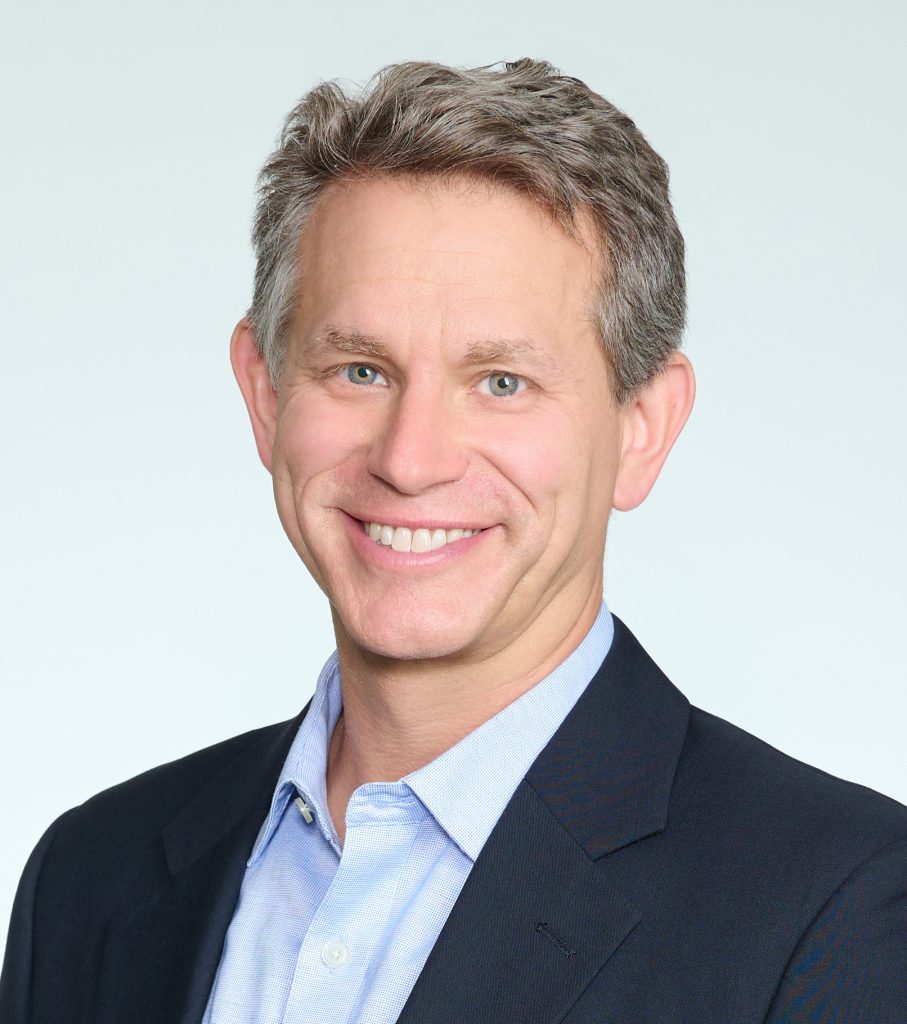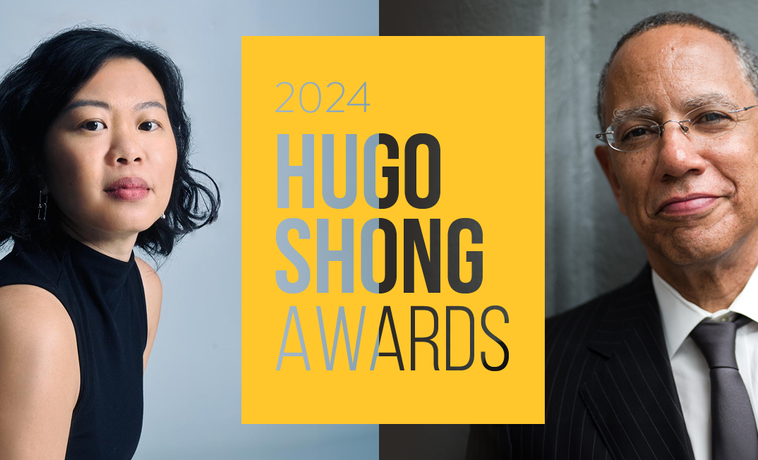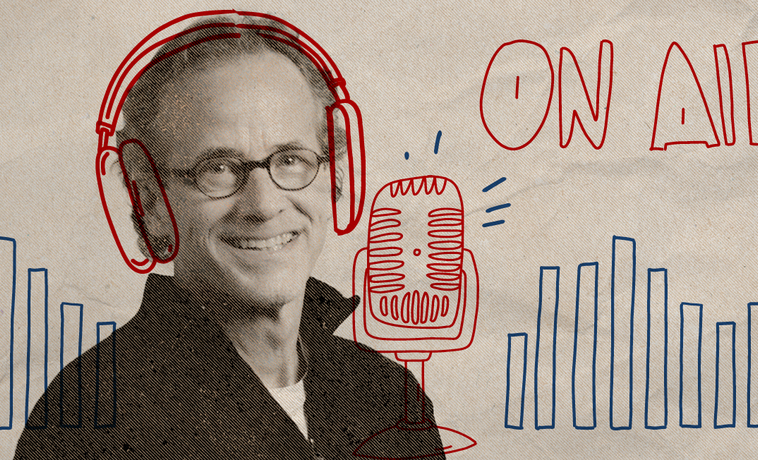Journalist David Abel Reflects on the Boston Marathon Bombings a Decade Later
New COM professor documented the aftermath of the attack

COM Professor of the Practice David Abel (crouching, center), then a reporter for the Boston Globe, takes photos just after the bombing at the 117th Boston Marathon. Credit: Boston Globe / Getty.
In April 2013, Boston Globe reporter David Abel had been on leave from his job for almost a year. He had spent that time as a Nieman Fellow at Harvard University, studying documentary filmmaking, among other things. For a final project for one of his classes, Abel was producing a short documentary about Juli Windsor, who hoped to become the first person with dwarfism to finish the Boston Marathon.

Windsor was stopped about a mile short of accomplishing that goal after two homemade bombs exploded near the finish line, killing three people—including BU graduate student Lu Lingzi (GRS’13)—and injuring hundreds. Abel was lucky to escape physical harm. Standing just steps from the first explosion, he recorded dramatic footage of first responders and civilians rushing to treat the wounded.
Abel was a member of the Globe team awarded a Pulitzer Prize for breaking news reporting of the bombing and spent much of the next year covering the stories of people impacted by the attack—including the family of Martin Richard. He also completed his short film about Windsor and produced a feature-length documentary about her return to the Boston Marathon in 2014 to accomplish her goal of finishing.
Abel joined COM as a professor of the practice of journalism in 2022. He spoke with COMtalk about covering the attack and the aftermath—memories that still bring him to tears a decade after the bombings.
Q&A
With David Abel
COMtalk: How did April 15, 2013, begin for you?
David Abel: I was up with Juli Windsor around dawn as she was getting ready. I filmed her as she was crossing the starting line in Hopkinton. I made it to the finish line and I was taking in this incredibly beautiful scene of hundreds of runners making their final steps toward the finish line, with thousands of people on both sides of Boylston Street cheering them on. I like to say that there’s no more basic act of love than strangers cheering strangers. Then, about 15 or 20 steps from where I was standing, the first bomb went off.
COMtalk: What were those first moments after the explosion like?
David Abel: At first I felt it more than anything else—it was kind of like a pressure wave of some sort. And yet, when the first bomb went off, I had no idea what had happened. Then, when the second bomb went off, it immediately became clear that this was an attack. There was this amazing group of police officers and other people who ran toward the barricades [near the first explosion]. I realized that I was holding a camera and that I had a job. I instinctively ran toward it and filmed through the smoke. It was the most horrible thing I’ve ever seen.
COMtalk: Had any of your previous experiences prepared you to cover the bombing?
David Abel: I’ve been in pretty gnarly places. I have covered wars and I also have covered natural disasters. I’ve seen some pretty awful things, but nothing can prepare you for the instantaneous change from euphoria—watching all these people accomplish a lifelong dream—to the most horrible possible thing that could happen. There was no way to prepare for that.
COMtalk: You eventually began telling stories of people who were impacted by the bombing, like the Richard family. How did you find that focus?
David Abel: You can hear in my voice that, like a lot of people who witnessed that 10 years ago, it left a deep impact on me. People had to find their own way to cope with what they experienced and, for me, the way I dealt with it was by trying to look at it as closely as possible and to tell the stories of those who were more affected. I told the stories of children who were on the finish line that day, of nurses who had PTSD, and doctors who used marathon medals to tie tourniquets. I had one skill and that was to tell stories, so that’s what I tried to do.
COMtalk: How do you tell stories that are so personal and so emotional without them becoming too sentimental?
David Abel: With care and compassion. By trying to find the nuance that distinguishes one story from another, because we wrote a lot of stories and the bar would rise with each story—like what distinguishes this story from the last one I wrote? Why is this worth writing? How much is too much? When is it just syrupy? When is it disaster porn? But I feel like each story that I found my way to was novel and shed light on the impacts in a way that maybe hadn’t been told before and felt useful, important and helpful. I remember I wrote a story about the Fourth of July and how people were setting off M-80s. Every time I heard a large firecracker go off, I flinched. I still do. I wrote about that reverberation of the trauma and how it was affecting a lot of people. I think I was able to come to that story through my own experience, but told it through other people.
COMtalk: The Boston Globe played a major role in covering the bombing and the events that followed. What can you say about the value of local journalism in a moment of tragedy like that?
David Abel: That really made me appreciate how vital a city daily is, where you can see all of the amazing qualities and all of the great talents come together in an instant. That included brilliant and brave photographers, intense and beautiful narrative writing, and editors who were laboring over every word. And we made mistakes. It wasn’t flawless. But I think it’s an example of a newspaper being the heart of the city in the best way possible.
COMtalk: You’ve run the Boston Marathon several times, including the year after the bombing. What makes the race special to you?
David Abel: I had run the [2007] Chicago Marathon when it was 95 degrees and they ran out of water. We were running around fire trucks that were trying to block the route. The fans were gone. It was just crazy. The Boston Marathon is a stark contrast for me in that it’s the people who carry you through. The year before the bombings, I ran the Boston Marathon and it was similarly hot. Within the first half mile I was so dehydrated that I had to walk. I remember thinking, “How the hell am I going to make it 26 miles?” Then there was a guy standing on his front lawn with a hose. He hosed me down and I started running. Then a half a mile later there was another guy, with oranges and water. It was the community that made it possible for me to get to the finish line—and that was the thing that I worried wouldn’t be back in 2014. But they were, and it was incredibly powerful.
COMtalk: Do you have plans for Patriots Day this year?
David Abel: I don’t. For a number of years, I’ve kept my distance. I felt like I had to move on from that experience because it was such a part of my psyche. This conversation is the first time I put thought into that question. It’s now a decade later and I don’t know exactly what I’m going to do. It’s still hard for me to talk about but I don’t shy away from that emotion—it’s just part of me at this point.
This interview has been edited for brevity and clarity.


